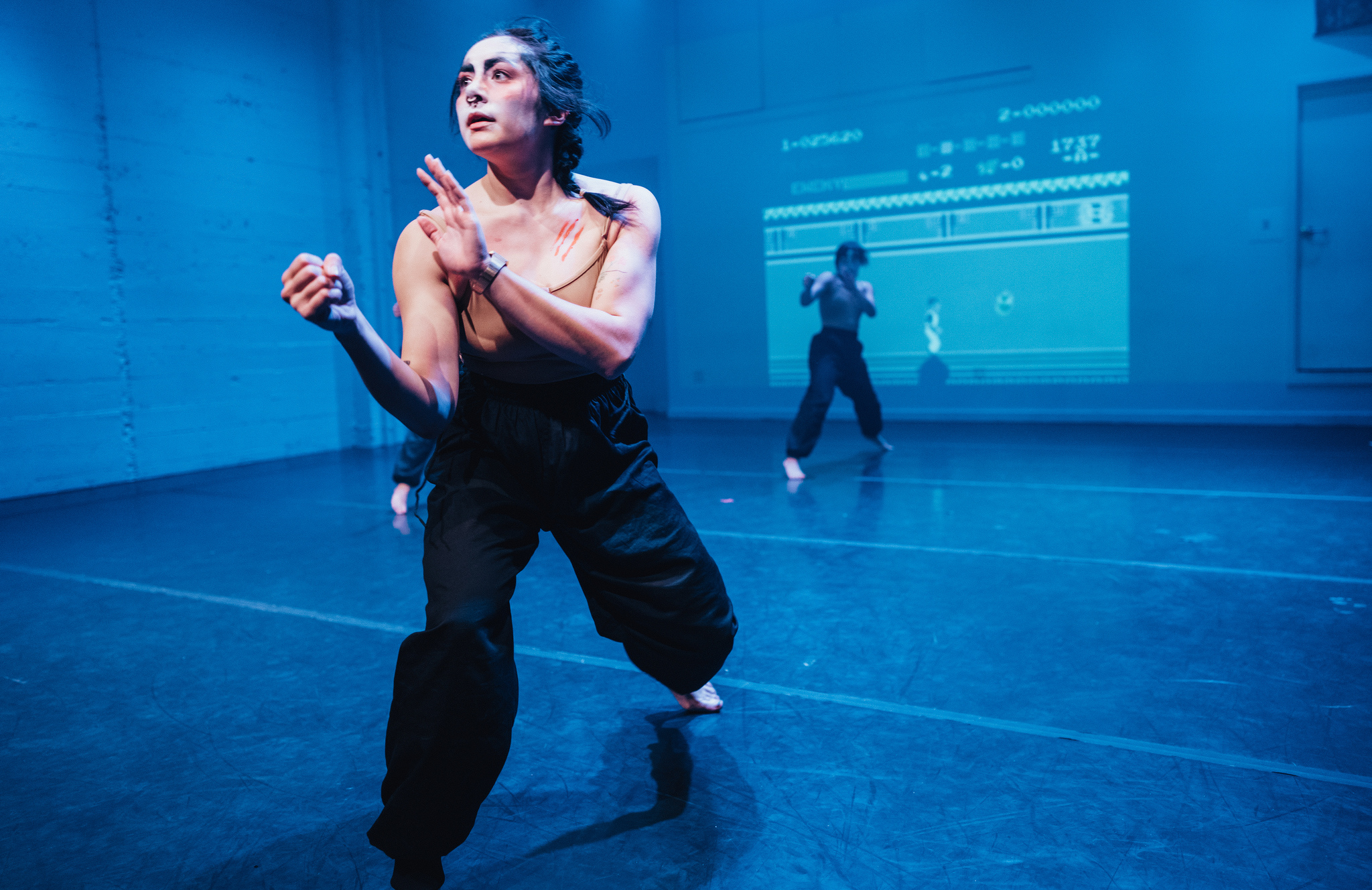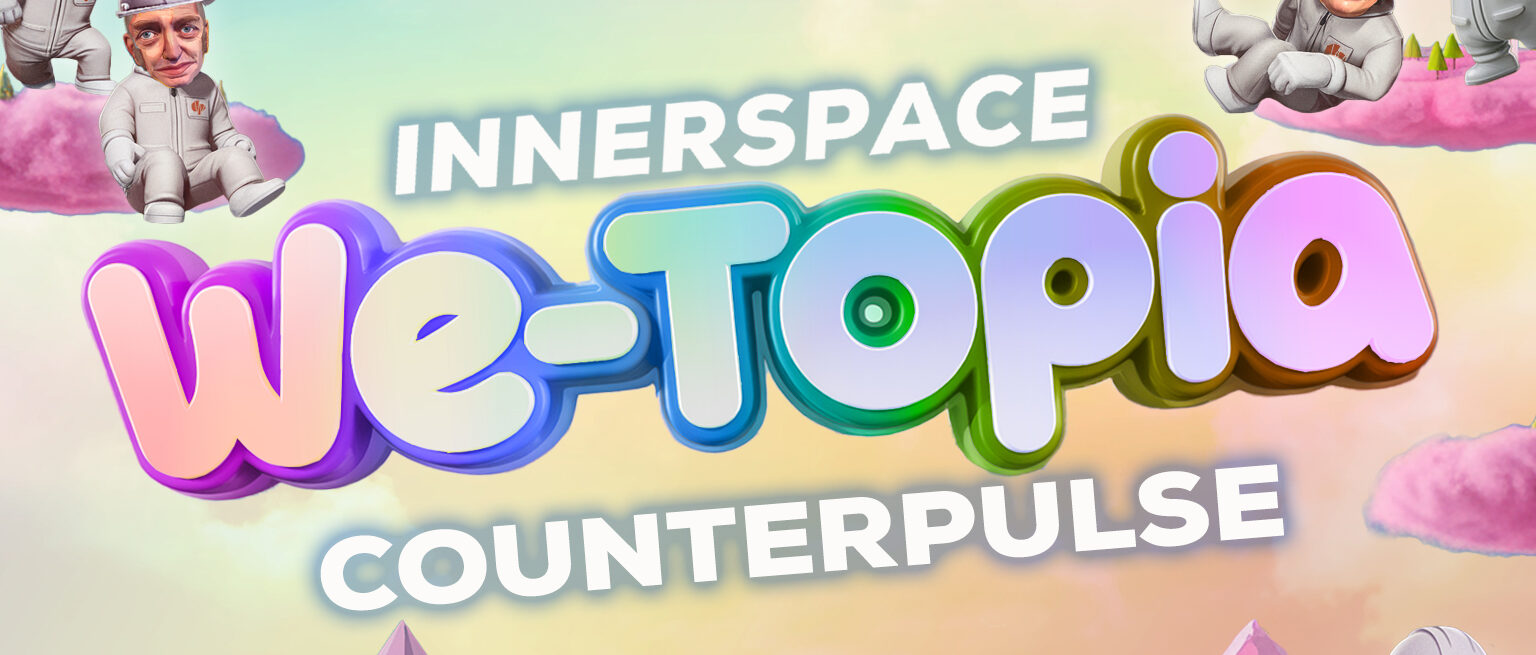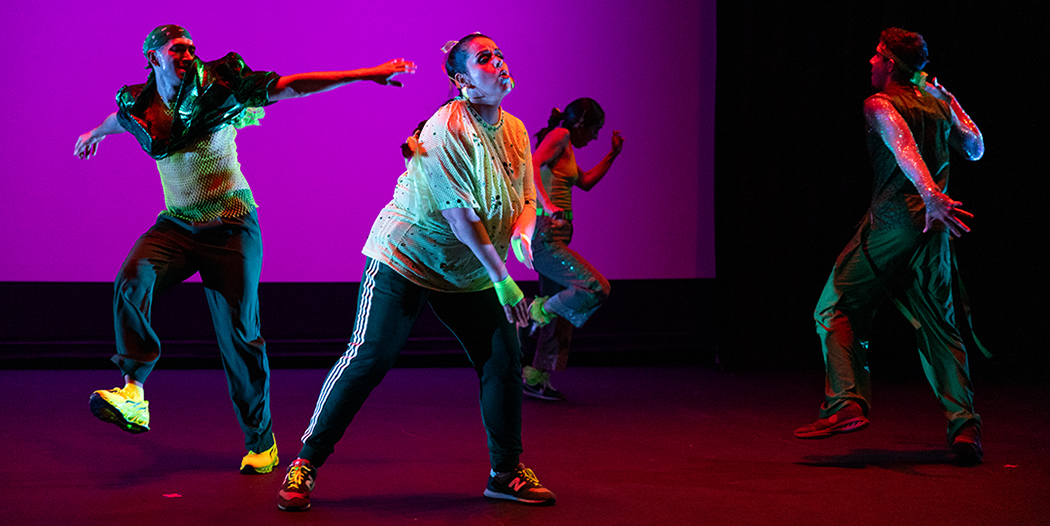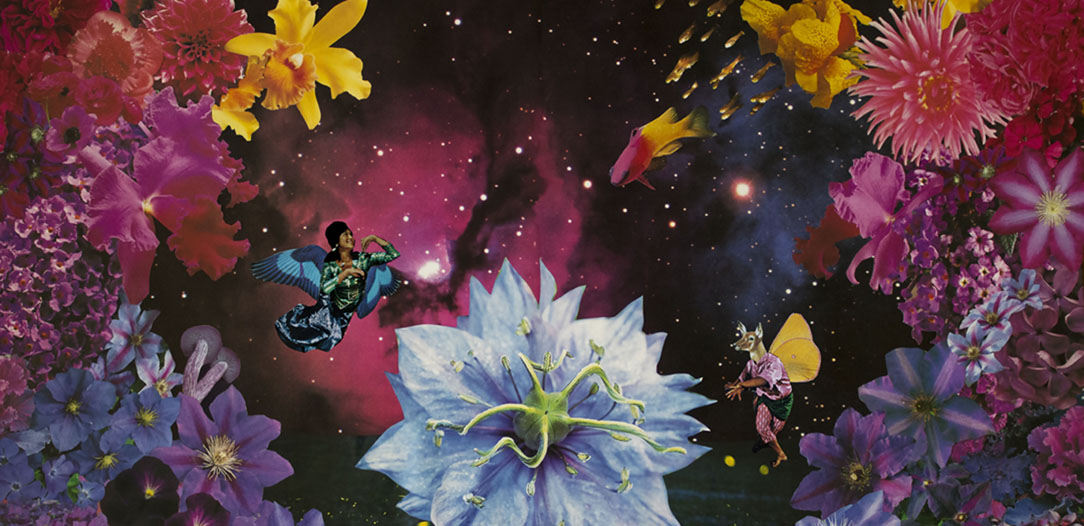Performing Diaspora 2018 artists Cynthia Ling Lee and Melissa Lewis in conversation.
Cynthia Ling Lee: I’m excited to chat about your work today! Tell me a little about the initial inspiration for your work. Where did it come from?
Melissa Lewis: I had this wild and weird dream some time ago. Bruce Lee (or some version of him) was there visiting me, and we were in close proximity in somebody’s home somewhere, doing mundane things around a home. It seemed like he was a father to me. It’s a rather foggy and fuzzy dream memory—but for whatever reason I jolted awake at 3am in the middle of the night, and there was this vision of a performance I felt like I had to make… that I frantically scribbled down for hours. I guess that’s the very cosmic answer; but it also comes from a broader place of identity.
CLL: Wow, that’s amazing. What does it mean to dream of Bruce Lee as your father? What might that say about you and your lineages?
ML: I think it relates to my Chinese identity, definitely.
I didn’t grow up with a Chinese father. My mother is Chinese, from Beijing. My father is white and from Florida. I always wondered what it would be like to be fully Chinese. Or not Chinese at all. Mixedness was hard. I grew up feeling both very distant and very very close to my Chineseness.
CLL: Tell me more.
ML: I grew up in a very small, white, suburban town in Massachusetts, and there was always tension in how I saw myself in relation to my Chinese mother and white father. Culturally I was raised by my mother, and it was a very Chinese childhood. Often I hated it, in some small places I found joy… like with Chinese dance and Chinese folk arts. Chinese friends. But in other spaces, especially as a younger child, I was othered a lot, which people are generally surprised by now, as I’m much more white-passing as an adult.
It’s still something I’m sifting through now. And I think this work is in part an attempt for me to consider those personal questions.
CLL: It seems like a thing that many mixed heritage folks grapple with—this feeling that they’re not “fully” one thing or another.
I also feel like it’s related to how Asian people are racialized in the United States, vs., say, Black folks.
The one drop rule, with its entanglement with a history of enslavement, means that anyone who has African heritage is but for us, it feels like having any heritage that isn’t Asian makes us “not fully” Asian. But interestingly, Bruce Lee had some European heritage, right? Or there are rumors that he did?
ML: Totally!
His lineage is not 100% clear, but the ancestry points to a grandmother “of Eurasian descent.” The most recent book on Bruce’s life (by Matthew Polly) offers this breakdown: “five-eighths Han Chinese, one quarter English, and one eighth Dutch-Jewish.” Whatever the math is, I see the way Bruce was walking the line between his two worlds. He treated that straddling task with a sense of dedication and mastery, like everything else he did.
He faced a lot of racism from older Chinese martial artists, because he was not “full Chinese,” and then when he began teaching to Westerners (he was the first to set this precedent by assembling the most racially diverse school of students, essentially becoming an icon for Afro-Asian unity) he ALSO received a lot of hatred from Chinese people—and this is all layered on top of the anti-Chinese racism from the Western gaze…while also being embraced, loved, and sexualized by Hollywood!
CLL: That’s so rich and charged. How are some of those complexities coming out in the work, if at all?
ML: Hmm. Hard question! I think it’s there, maybe not so overtly, but by suggestion. I hope the work asks people to consider and reconsider what their stereotypes are. There are some moments in which we might appear to meet the ‘Bruce Lee’ stereotypes, and in doing that consciously I hope put more responsibility on the viewer. One example: “Kung Fu Fighting” by Carl Douglas.
CLL: OMG, that song. Tell me more about it.
ML: Super popular song! suuuuper racist. but people still love singing this at karaoke! everyone knows it.
CLL: It’s catchy! And was by Carl Douglas!
ML: It’s complicated!
CLL: It’s complicated.
ML: And… it also came out the year after Bruce Lee died.
CLL: Wow, so there’s that too.
ML: That’s also been a part of this process. Asking, “what else was happening in the world when Bruce Lee existed?”
We’re definitely in a different time in the world of this piece, but I’m not sure if it is in the 1970s or 1960s, or if it’s some weird Chinese-futurism dream world.
CLL: Interesting to think about time that way, especially since Bruce Lee appeared to you in a dream, and dreams can collapse past, present, and future in unexpected ways.
Can I circle back to “Kung Fu Fighting” for a minute? You’re doing that section in drag, right? Can you tell me a little more about that? How are you playing with, exploding, or challenging stereotypes through that particular aesthetic?
ML: Yes. I just recently started my adventure into drag. As Deuce Lee. To me, it’s a way to not only over-perform gender, but also to perform Chineseness. To re-reference stereotypes and embody liminality.
CLL: Thinking about drag in terms of both ethnicity and gender is fascinating.
ML: It’s been really interesting to put on Chinese Opera makeup and look like an angry Chinese man… and have every reaction, from someone feeling reflected on stage and affirmed in mixed Asian identity, to “oh I hope you’re Chinese if you’re doing that”
Cynthia Ling Lee: LOL.
ML: YES. lol indeed! But so important that that is coming to mind and challenging folks.
But, there is also something I’m trying to figure out, related to the drag question: masculinity and violence in martial arts and Bruce Lee. That also feels present in this inquiry into drag, racism, gender.
CLL: There’s a way in which the stereotypes of effeminacy and passivity that get attached to Asian men are troubled by the figure of Bruce Lee in general and by your (campy? satirical?) performance of him as angry Chinese opera man in particular. How does your own gender identity and expression fit into this?
ML: I am a pretty femme-ish person, and I’ve never felt very comfortable with violence, especially in my own body. I was never taught to fight or be violent. But I circle back to this idea that the reason for fighting is for survival and that comes forth for so many minority histories. In our training of Bruce Lee’s style of martial arts (Jeet Kune Do, or JKD) I feel like I come up against how gendered things are and my own personal discomfort with violence, but I think that’s an interesting territory to play within in the work—there is a lot of switching between femininity and masculinity, hardness and softness, attack and defense.
CLL: Sounds like really rich territory. I’d like to hear more about your training in and/or use of Jeet Kune Do in the work.
ML: My training prior to this project is mixed: western contemporary forms (ballet, modern, etc) and traditional Chinese forms (Chinese folk dance, basic martial arts).
I was introduced by Lenora Lee (a mentor and guide in this project) to a small community of folks who train with a teacher (a student of a student of Bruce’s) in a garage in Daly City. I go weekly, with one of my collaborators, Nina. Derek (the teacher) also visits our rehearsal to do some special training sessions for all of us. My main cast is comprised of 3 queer women. We’re overall pretty green as it goes in terms of our background in martial arts, and all entirely new to JKD.
JKD is an incredibly efficient form. Every move has functionality and emphasis on speed and power only. no big flashy moves, like you see in Bruce’s movies. It’s almost like modern/post-modern kung fu.
CLL: Interesting to hear how it differs from the Hollywood version that many of us are more familiar with.
ML: To train and research in this way feels foreign, physically, but I think we all struggle with putting it into practice. The idea of causing pain to someone else’s body is uncomfortable (we have a lot of nervous laughter while training), definitely. But it is also fun and meaningful to absorb a new movement practice in a supportive learning community—specifically a Chinese form that we can pin to our larger shared lineages of fighting, resilience, and unity. It’s a process of trying on violence, but then also figuring out how to re-articulate and satirize it.
I dreamed Bruce Lee was my father by Melissa Lewis (顾眉) runs Thu-Sat, Dec 6-8 and 13-15 as part of a double-billed performance with Cynthia Ling Lee. Get tickets to Performing Diaspora 2018 at counterpulse.org/performing-diaspora-2018
Photo by Matthew Bodaly
Share This!
More Good Stuff
Thursday March 6th • 5PM - 10PM Step into a world where imagination shapes reality at CounterPulse’s annual gala! This year, INNERSPACE: We-Topia is
Primera Generación Dance Collective is ready to be back in San Francisco! We are so excited to perform and be in community with our
Embodying Utopia is a project created to give queer people the space to imagine what an ideal world would look like for them.




